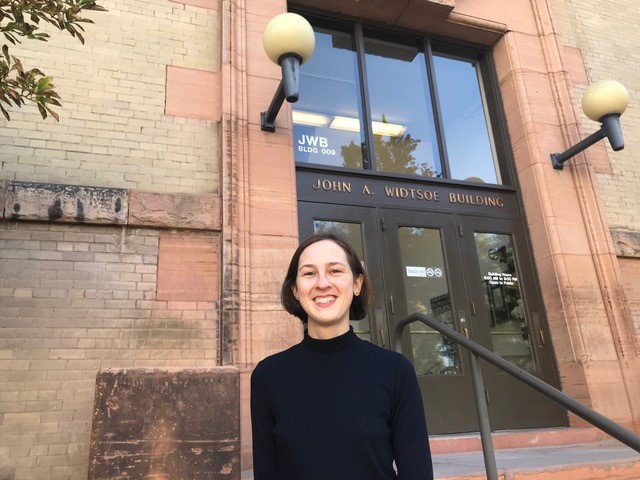Meet a Participant: China Mauck

While participating in the National Science Foundation Mathematical Sciences Graduate Internship Program, China Mauck gained experience in applied mathematics, using it in her research on acoustic metamaterials.
From Musician to Aspiring Scientist: A Journey of Discovery
China Mauck never imagined a career in science and math. A talented musician all through high school, Mauck spent hours each day practicing piano, marimba and drums. She excelled in math and science, but simply chalked up her success to meticulous study habits.
It wasn’t until Mauck began applying to colleges that she realized, while she loved music, she wasn’t passionate enough about it to make it her career. In a move that surprised her friends and family, Mauck switched course, deciding to pursue a degree in math. Initially, she had doubts. Was giving up music to pursue math the right choice?
“I was convinced I would be second-guessing myself for the rest of my life,” Mauck said. “Looking back, I am confident I made the right decision. I never feel like I lost anything by not pursing music after high school. To the contrary, I feel like my childhood of musical study has been central to my success in math. It instilled in me a drive to always be working and practicing with a goal in mind. The creativity involved in musical interpretation and performance now helps me think innovatively when I approach new mathematical problems.”
While a doctoral student at the University of Utah, Mauck recently completed the National Science Foundation (NSF) Mathematical Sciences Graduate Internship (MSGI) Program. The NSF MSGI Program provides research opportunities for mathematical sciences doctoral students to participate in internships at national laboratories, industries and other facilities. NSF MSGI seeks to provide hands-on experience for the use of mathematics in a nonacademic setting.
In a fitting complement to her musical roots, Mauck was appointed to the Signature Physics Branch at the Cold Regions Research and Engineering Laboratory in Hanover, New Hampshire, where she contributed to a project in physical acoustics. Under the mentorship of Michael Muhlestein, Ph.D., Mauck sought to identify connections between porous acoustic metamaterials and Willis materials. Metamaterials are structures consisting of multiple materials carefully arranged such that the composite structure exhibits unique properties that may not be found in nature. Acoustic metamaterials can be used to control sound waves. Willis materials are structures that exhibit Willis coupling, a coupling of the momentum-velocity and pressure-density equations that can arise from intrinsic asymmetry.
“Projects of this sort are the motivating force for major innovations in the future. Specifically, research in acoustic metamaterials has applications in any area where it is necessary to control or manipulate sound, such as noise muffling or acoustic cloaking,” Mauck said.
During the first several weeks of her internship, Mauck reviewed background research and literature on physical acoustics. Later, she was able to improve her Python™ skills by using the programming language for numerical optimization to determine how to construct porous acoustic metamaterials that exhibit Willis coupling.
For Mauck, the most rewarding part of the program was interacting with team members. Their discussions about the applications and experimental goals of the project gave her new perspectives in how applied mathematics shapes the world.
“By far, the most important experience was simply being part of a team of scientists and engineers who were not mathematicians,” Mauck said. “It forced me to think about problems differently and ask new questions.”
After finishing the program, Mauck became even more certain a career outside academia is for her. “With research in an academic setting, I periodically find myself caught up in the theory of a problem, losing sight of the physical outcomes and goals, which often provide necessary insights that keep the theory strong,” Mauck said.
Until graduation, however, she will continue to be involved in the Society for Industrial and Applied Mathematics (SIAM) student chapter at her school.
The NSF MSGI Program is funded by NSF and administered through the U.S. Department of Energy’s (DOE) Oak Ridge Institute for Science and Education (ORISE). ORISE is managed for DOE by ORAU.


